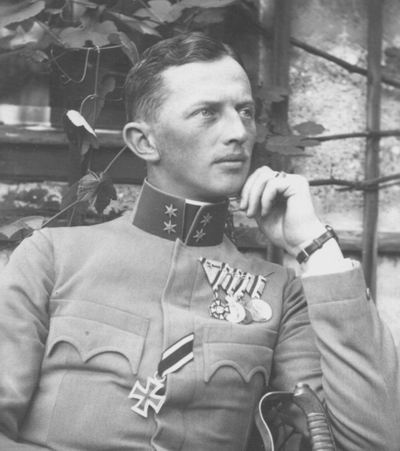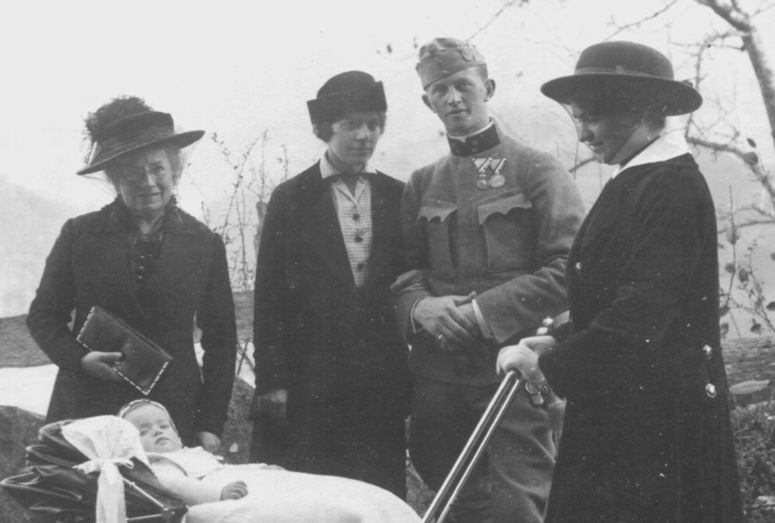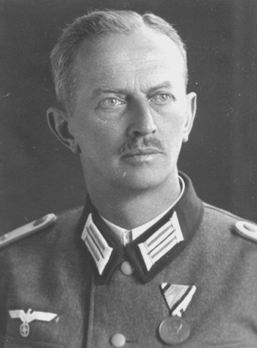Anton Jungwirth
 Anton Jungwirth was born at Oberndorf (Salzburg) on the 25th of
September 1889. Following the early death of his father in 1895 he attended a
boarding school at
Feldkirch (Vorarlberg) and finally his mother moved with the children to
Innsbruck, her hometown, in 1904. At Innsbruck, Anton Jungwirth started to study
law at the Leopold-Franzens-Universität in 1908. In 1910/11 he served as a one
year volunteer with the 1st regiment of the
Tiroler Kaiserjäger and successfully passed the first state examination in law
(Erste Staatsprüfung) in 1913. Because his family was not rich he had to work
in addition to his studies as an editor for a Tyrolian newspaper. With the
outbreak of war in 1914 he was immediately called to arms as a Fähnrich in Feldjäger
Bataillon number 19, going directly to the eastern front in Galicia.
Anton Jungwirth was born at Oberndorf (Salzburg) on the 25th of
September 1889. Following the early death of his father in 1895 he attended a
boarding school at
Feldkirch (Vorarlberg) and finally his mother moved with the children to
Innsbruck, her hometown, in 1904. At Innsbruck, Anton Jungwirth started to study
law at the Leopold-Franzens-Universität in 1908. In 1910/11 he served as a one
year volunteer with the 1st regiment of the
Tiroler Kaiserjäger and successfully passed the first state examination in law
(Erste Staatsprüfung) in 1913. Because his family was not rich he had to work
in addition to his studies as an editor for a Tyrolian newspaper. With the
outbreak of war in 1914 he was immediately called to arms as a Fähnrich in Feldjäger
Bataillon number 19, going directly to the eastern front in Galicia.
As a platoon commander Fähnrich Jungwirth took part in all the actions
of his unit in Russian Poland. On the 22nd and 23rd of October 1914 we find him and his men south of Ivangorod on the left bank of the
Vistula river in General der Kavallerie Viktor Dankl's 1st army as a part of the
14th Infantry Division.
The Austro-Hungarian troops were held by superior Russian forces with well placed
machine-guns and the marshy country between both armies was a knee deep morass. The situation became critical and Fähnrich
Jungwirth's platoon
was the nearest to the enemy and he therefore decided to attack. Collecting all
the men he
could get, he assaulted the much superior Russian forces with a group in about
company strength. The Russians were so surprised that it worked, the whole battalion
followed the example of this brave Fähnrich and at the end of this
day they had captured 13 Russian officers, including a battalion commander, 620
NCOs and men, 4 machine guns and over 200 hand grenades! For this fine example of
heroism Fähnrich Anton Jungwirth was honored with the award of the Golden
Bravery Medal. From today's point of view it is interesting to notice that the recommendation
for the medal was made on the 24th of October 1914, he received the
medal on the 1st of December 1914 from his battalion commander, the date of the
imperial decree was given as the 31st of December 1914 and the award was published
in the
Personalverordnungsblatt on the 6th January 1915 - and this was the procedure under
nearly "peacetime" conditions at the beginning of the war. One could
imagine how long it would take in 1917 or 1918!
 Fähnrich Jungwirth is
also a fine
example of another awarding practice: When the war started in 1914 the need for orders and metals was much higher than in any
previous war because of the
huge number of personnel engaged and on the other hand precious metals, especially
gold were rare and it was therefore decided that all older types of Golden Bravery
Medals should be utilized from stock and this is why many of the Golden Bravery
Medals which were awarded in 1914 and early 1915 were not of the 3rd type
(1866-1916) but of the 2nd type (1859-1866) and even of the 1st type
(1848-1859) production. If one looks closer at the original photos of Anton
Jungwirth, one can see that he received a medal of the 1848 type!
Fähnrich Jungwirth is
also a fine
example of another awarding practice: When the war started in 1914 the need for orders and metals was much higher than in any
previous war because of the
huge number of personnel engaged and on the other hand precious metals, especially
gold were rare and it was therefore decided that all older types of Golden Bravery
Medals should be utilized from stock and this is why many of the Golden Bravery
Medals which were awarded in 1914 and early 1915 were not of the 3rd type
(1866-1916) but of the 2nd type (1859-1866) and even of the 1st type
(1848-1859) production. If one looks closer at the original photos of Anton
Jungwirth, one can see that he received a medal of the 1848 type!
On the 1st of November 1914 Anton Jungwirth was promoted to
Leutnant in der Reserve with seniority number 4264 and on the 21st of November
1914 he received a commendation of the Kaiser which allowed him to wear the
Bronze Military Merit Medal (Signum Laudis) with war decoration.
 For his
performance during the battles near Novo-Aleksiniec in the autumn of 1915 he was honored
with an accelerated promotion to Oberleutnant in der Reserve on the 13th of
September 1915 and
on the 29th of October 1915 again received the commendation of the Kaiser which allowed
him to wear the Silver Military Merit Medal (Signum Laudis) with war decoration
. These awards and a light wound allowed him to have a
longer leave at home with his mother and his intended, Elsa Schober, at
Innsbruck. Returning to the frontlines he again distinguished himself and was
honored by the award of the Military Merit Cross 3rd class with war decoration
on the 16th of December 1916 and was recognized by the German allies with the award of
the Iron Cross 2nd class in the Spring of 1917. When the sword emblems were introduced
in 1917 he received them retroactively for all his previously awarded decorations
and of course he received the Karl-Truppen-Kreuz.
For his
performance during the battles near Novo-Aleksiniec in the autumn of 1915 he was honored
with an accelerated promotion to Oberleutnant in der Reserve on the 13th of
September 1915 and
on the 29th of October 1915 again received the commendation of the Kaiser which allowed
him to wear the Silver Military Merit Medal (Signum Laudis) with war decoration
. These awards and a light wound allowed him to have a
longer leave at home with his mother and his intended, Elsa Schober, at
Innsbruck. Returning to the frontlines he again distinguished himself and was
honored by the award of the Military Merit Cross 3rd class with war decoration
on the 16th of December 1916 and was recognized by the German allies with the award of
the Iron Cross 2nd class in the Spring of 1917. When the sword emblems were introduced
in 1917 he received them retroactively for all his previously awarded decorations
and of course he received the Karl-Truppen-Kreuz.
After the war Dr. Anton Jungwirth did his prescribed law court
practice at the Landesgericht Innsbruck and married Elsa Schober on the 20th of
August 1919 with whom he had a son, Walther, born in 1920. After a year as an
aspirant lawyer at the law practice of Dr. Richard Steidle he successfully passed
his last examinations and on the 1st of January 1922 opened his own law practice
in Innsbruck . Over the years Dr. Jungwirth was also engaged with the Tyrolean lawyers'
association (Tiroler Rechtsanwaltskammer)
and was during his later years elected vice-president of this professional
association. After the occupation of Austria by German troops in March 1938 he
was called up into the German Wehrmacht and sent on a training course for
reserve officers in Bregenz. He took part in the occupation of the Sudetenland
and in the war against Poland in 1939. During the war he was employed on
occupation duties in France and finally, in the meantime having been promoted to Hauptmann
der Reserve, in Norway. His only son Walther Jungwirth was killed in action as a
Leutnant on the invasion front. Dr. Anton Jungwirth died on the 3rd of May 1966
at Innsbruck and was buried there at the Mühlauer Friedhof.
Back to Miscellaneous Biographies

 Anton Jungwirth was born at Oberndorf (Salzburg) on the 25th of
September 1889. Following the early death of his father in 1895 he attended a
boarding school at
Feldkirch (Vorarlberg) and finally his mother moved with the children to
Innsbruck, her hometown, in 1904. At Innsbruck, Anton Jungwirth started to study
law at the Leopold-Franzens-Universität in 1908. In 1910/11 he served as a one
year volunteer with the 1st regiment of the
Tiroler Kaiserjäger and successfully passed the first state examination in law
(Erste Staatsprüfung) in 1913. Because his family was not rich he had to work
in addition to his studies as an editor for a Tyrolian newspaper. With the
outbreak of war in 1914 he was immediately called to arms as a Fähnrich in Feldjäger
Bataillon number 19, going directly to the eastern front in Galicia.
Anton Jungwirth was born at Oberndorf (Salzburg) on the 25th of
September 1889. Following the early death of his father in 1895 he attended a
boarding school at
Feldkirch (Vorarlberg) and finally his mother moved with the children to
Innsbruck, her hometown, in 1904. At Innsbruck, Anton Jungwirth started to study
law at the Leopold-Franzens-Universität in 1908. In 1910/11 he served as a one
year volunteer with the 1st regiment of the
Tiroler Kaiserjäger and successfully passed the first state examination in law
(Erste Staatsprüfung) in 1913. Because his family was not rich he had to work
in addition to his studies as an editor for a Tyrolian newspaper. With the
outbreak of war in 1914 he was immediately called to arms as a Fähnrich in Feldjäger
Bataillon number 19, going directly to the eastern front in Galicia. Fähnrich Jungwirth is
also a fine
example of another awarding practice: When the war started in 1914 the need for orders and metals was much higher than in any
previous war because of the
huge number of personnel engaged and on the other hand precious metals, especially
gold were rare and it was therefore decided that all older types of Golden Bravery
Medals should be utilized from stock and this is why many of the Golden Bravery
Medals which were awarded in 1914 and early 1915 were not of the 3rd type
(1866-1916) but of the 2nd type (1859-1866) and even of the 1st type
(1848-1859) production. If one looks closer at the original photos of Anton
Jungwirth, one can see that he received a medal of the 1848 type!
Fähnrich Jungwirth is
also a fine
example of another awarding practice: When the war started in 1914 the need for orders and metals was much higher than in any
previous war because of the
huge number of personnel engaged and on the other hand precious metals, especially
gold were rare and it was therefore decided that all older types of Golden Bravery
Medals should be utilized from stock and this is why many of the Golden Bravery
Medals which were awarded in 1914 and early 1915 were not of the 3rd type
(1866-1916) but of the 2nd type (1859-1866) and even of the 1st type
(1848-1859) production. If one looks closer at the original photos of Anton
Jungwirth, one can see that he received a medal of the 1848 type! For his
performance during the battles near Novo-Aleksiniec in the autumn of 1915 he was honored
with an accelerated promotion to Oberleutnant in der Reserve on the 13th of
September 1915 and
on the 29th of October 1915 again received the commendation of the Kaiser which allowed
him to wear the Silver Military Merit Medal (Signum Laudis) with war decoration
. These awards and a light wound allowed him to have a
longer leave at home with his mother and his intended, Elsa Schober, at
Innsbruck. Returning to the frontlines he again distinguished himself and was
honored by the award of the Military Merit Cross 3rd class with war decoration
on the 16th of December 1916 and was recognized by the German allies with the award of
the Iron Cross 2nd class in the Spring of 1917. When the sword emblems were introduced
in 1917 he received them retroactively for all his previously awarded decorations
and of course he received the Karl-Truppen-Kreuz.
For his
performance during the battles near Novo-Aleksiniec in the autumn of 1915 he was honored
with an accelerated promotion to Oberleutnant in der Reserve on the 13th of
September 1915 and
on the 29th of October 1915 again received the commendation of the Kaiser which allowed
him to wear the Silver Military Merit Medal (Signum Laudis) with war decoration
. These awards and a light wound allowed him to have a
longer leave at home with his mother and his intended, Elsa Schober, at
Innsbruck. Returning to the frontlines he again distinguished himself and was
honored by the award of the Military Merit Cross 3rd class with war decoration
on the 16th of December 1916 and was recognized by the German allies with the award of
the Iron Cross 2nd class in the Spring of 1917. When the sword emblems were introduced
in 1917 he received them retroactively for all his previously awarded decorations
and of course he received the Karl-Truppen-Kreuz.